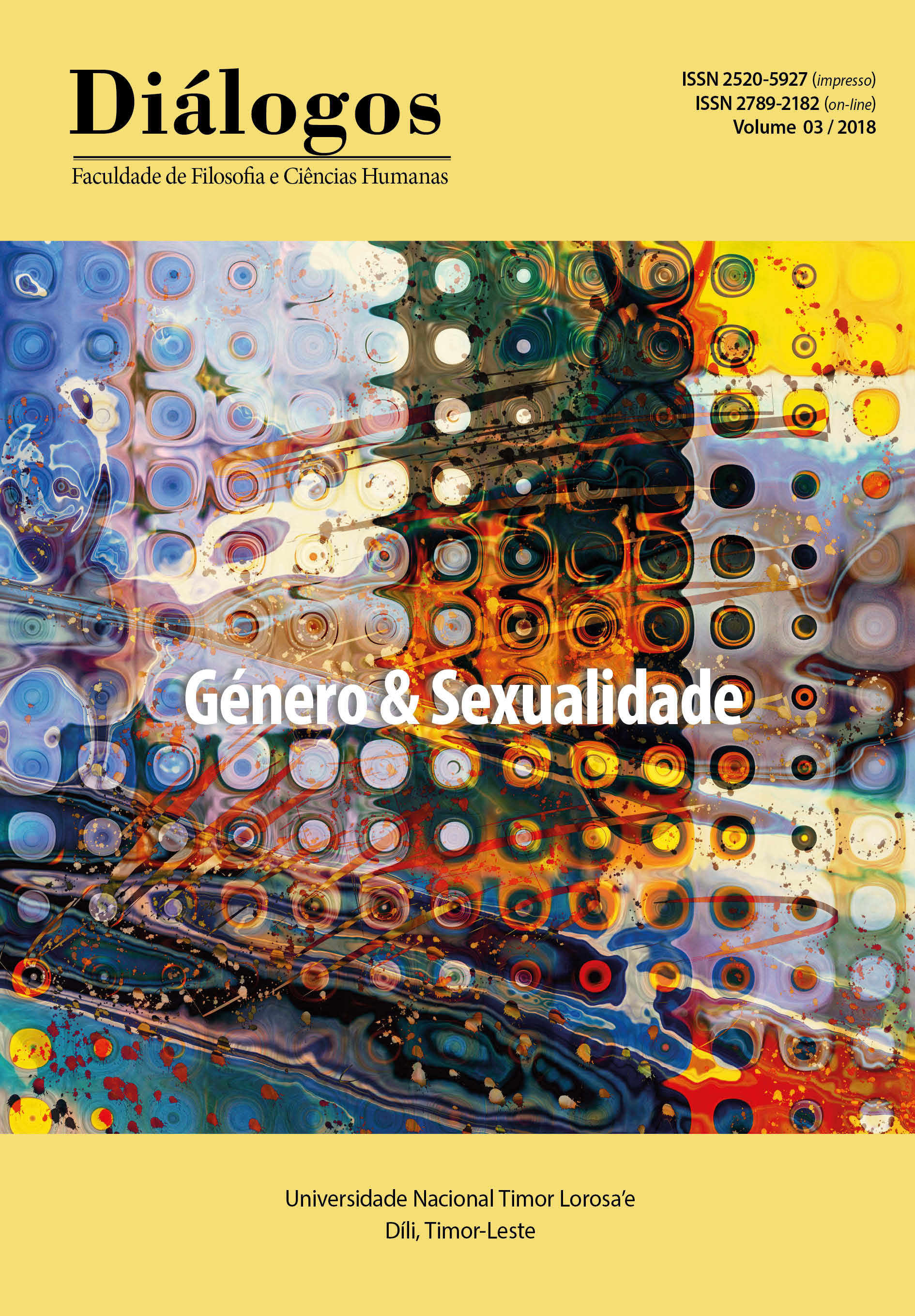Consentimento, Estraga Feto e Agência de Tomada de Decisão em Timor-Leste
DOI:
https://doi.org/10.53930/27892182.dialogos.3.90Palavras-chave:
Estupro, Violência sexual, Prevenção da violência sexual, ConsentimentoResumo
A violência sexual é um problema sério em Timor-Leste. são Com base nas histórias de mulheres sobreviventes de violência sexual e outras entrevistas conduzidas em Timor-Leste desde 2008, este artigo explora os entendimentos locais comuns sobre violência sexual como chave para melhorar as estratégias preventivas e legais destinadas a enfrentar este problema. Embora ainda haja muitas questões a serem respondidas, o trabalho de campo indica que o conceito de consentimento na tomada de decisão sexual é pouco compreendido, com a maioria dos membros da comunidade entendendo a violência sexual em relação ao termo local estraga feto. No entanto, isso é enganoso, pois o conceito de estraga feto vem de um paradigma diferente, impulsionado por ideias de honra familiar que dependentes da manutenção da virgindade de mulheres solteiras e meninas – e acompanhando ideias de ‘valor perdido’ para mulheres e meninas que perdem a virgindade fora do casamento. Para enfrentar a continuação dos abusos e a culpabilização das vítimas que podem surgir devido a esse paradigma, como mulheres e meninas casando com seus estupradores, sujeitas a mais abuso sexual ou violência, e/ou a perspectivas futuras limitadas, seria mais útil a longo prazo promover a educação dos membros da comunidade sobre o conceito de consentimento como um veto na tomada de decisões sexuais e reorientar a conversa para os direitos individuais das pessoas ao abrigo da lei.
Downloads
Referências
Alola Foundation. (2004). Trafficking in East Timor: A Look into the Newest Nation's Sex Industry. Dili: Alola Foundation.
Alves, M. D. F., Abrantes, L. S., & Reis, F. (2003). Written in Blood. Office for the Promotion of Equality. Dili.
Belton, S. (2011). Health Professionals and Lawyers Understandings of Domestic Violence and the Domestic Violence Law: the 2011 Judicial System Monitoring Program survey. In Hatene Kona Ba Timor Leste (vol. 2). TLSA: Dili.
Commission for Reception, Truth and Reconciliation in East Timor (CAVR). (2003). Public Hearing on Women and Conflict. www.easttimor.reconciliation.org.
Cummins, D. (2015). Local Governance in Timor-Leste: Lessons in Postcolonial Statebuilding. Routledge: London and New York. https://doi.org/10.4324/9781315757933
Fokupers. (1999). Gender-based Human Rights Abuses during the Pre-and Post-Ballot Violence in East Timor. January - October 1999. Dili.
General Directorate of Statistics (GDS); Ministry of Health and ICF. (2018). Timor-Leste Demographic and Health Survey 2016. Dili, Timor-Leste and Rockville, Maryland, USA: GDS and ICF.
Graydon, J. (2016). Valuing Women in Timor-Leste: The Need to Address Domestic Violence by Reforming Customary Law Approaches While Improving State Justice. PhD thesis, University of Melbourne.
Hynes, M., Robertson, K., Ward, J., & Crouse, C. (2004). A Determination of the Prevalence of Gender‐based Violence among Conflict‐affected Populations in East Timor. https://doi.org/10.1111/j.0361-3666.2004.00260.x
Kovar, A. (2012). Approaches to Domestic Violence Against Women in Timor-Leste: A Review and Critique Human Rights Education in Asia Pacific (Vol 3). pp. 207-52. Asia Pacific Human Rights Information Centre: Osaka.
Niner, S. (2011). Hakat Klot, Narrow Steps: Negotiating Gender in PostConflict Timor-Leste. International Feminist Journal of Politics (Vol 13, Issue 3), pp. 413-435. https://doi.org/10.1080/14616742.2011.587371
O'Keeffe, C. (2017). Understanding Gender in Conflict-Affected TimorLeste: Women's Voices on Marriage, Motherhood and Gender-Poverty-Violence Nexus. PhD thesis, National University of Ireland, Galway.
Pateman, C. (2008). Women and Consent. Political Theory, Vol. 8, No. 2. (May, 1980), pp. 149-168. https://doi.org/10.1177/009059178000800202
Paz y Desarrollo and National University of Timor-Lorosae (UNTL). (2013). Baseline Study on Attitudes and Perceptions of Gender and Masculinities of Youth in Timor-Leste. Paz y Desarrollo: Dili.
RDTL. (2009). Decree Law 19/2009 Penal Code of Timor-Leste. RDTL: Dili.
The Asia Foundation. (2012). Ami Sei Vitima Beibeik: Looking to the needs of Domestic Violence Victims. The Asia Foundation: Dili.
The Asia Foundation. (2016). Understanding Violence against Women and Children in Timor-Leste: Findings from the Nabilan Baseline Study - Main Report. The Asia Foundation: Dili.
Timor-Leste Armed Violence Assessment (TLAVA). (2009). After the Guns Fall Silent. Sexual and Gender-Based Violence in Timor-Leste. Issue Brief No. 5: November 2009. TLAVA: Dili.
Downloads
Publicado
Como Citar
Edição
Secção
Licença
Direitos de Autor (c) 2018 Deborah Cummins

Este trabalho encontra-se publicado com a Licença Internacional Creative Commons Atribuição 4.0.
Os autores que publicam nesta revista concordam com os seguintes termos:
- Os autores mantêm os direitos autorais e concedem à revista o direito de primeira publicação com o trabalho simultaneamente licenciado sob uma Licença Creative Commons Atribuição 4.0 Internacional que permite que outros compartilhem o trabalho com reconhecimento da autoria do trabalho e publicação inicial nesta revista.
- Os autores podem entrar em acordos contratuais adicionais separados para a distribuição não exclusiva da versão publicada do trabalho da revista (por exemplo, postá-lo em um repositório institucional ou publicá-lo em um livro), com um reconhecimento de sua publicação inicial em este jornal.
- Autores são autorizados e incentivados a postar seus trabalhos online (por exemplo, em repositórios institucionais ou em seu site) antes e durante o processo de submissão, pois isso pode levar a trocas produtivas, bem como citações mais precoces e maiores de trabalhos publicados.









